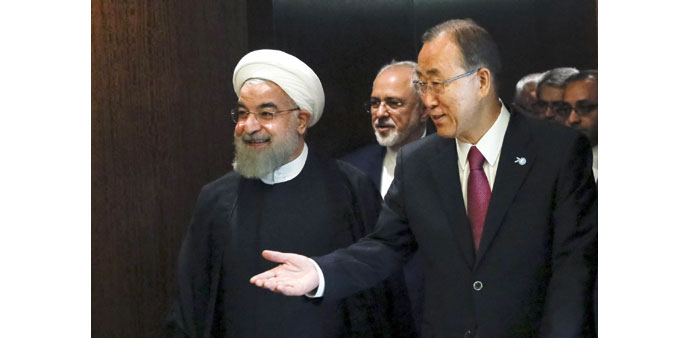UN Secretary-General Ban Ki-moon (right) leads Iran’s President Hassan Rouhani to their meeting at the United Nations headquarters ahead of the UN General Assembly in New York yesterday. Seen behind (second left) them is Iran’s Foreign Minister Mohammad Javad Zarif. The appeal is a strategy for Rouhani to encourage firms to lobby US Congress on Iran’s behalf, tapping into American corporations’ fears that they are being left behind by US sanctions that will remain in place.
Companies can thrive without government obstacles, he says; Iran leader sees “shared objectives” with Russia on Syria
Bloomberg
New York
Iran can offer US companies “unrivalled opportunities” in the Islamic Republic, Iranian President Hassan Rouhani said, dangling a carrot to business executives desperate for a new market to tap.
“All this depends on the US government and whether it wants to be an obstacle,” Rouhani, who is in New York for the UN General Assembly, told a group of senior media editors.
This appeal is a strategy for Rouhani to encourage corporations to lobby US Congress on Iran’s behalf, tapping into American corporations’ fears that they are being left behind by US sanctions that will remain in place. From Renault SA and Total SA to BP, European companies have already raced ahead of their American competitors to break into the market of 80mn consumers.
“Congress could still create new trade bans or reimpose sanctions that were lifted by the deal,” said Caitlin Webber, Bloomberg Intelligence government analyst based in Washington. “Congressional action would be a deterrent to potential investors in Iran and serve as a prelude for action under the next administration.”
Iran and six world powers reached a historic agreement on July 14 in Vienna, on curbing Iranian nuclear ambitions in exchange for easing of international sanctions. The accord survived the 60-day Congressional review, and is now being examined by Iranian parliament.
Although the nuclear deal reached on July 14 had improved US-Iran relations, the Iranian leader said the implementation of the agreement remained a “big test,” and there was still a long way to go before relations could be normalised.
Rouhani, on his third visit to the UN’s annual gathering of heads of government and state, also said Russian President Vladimir Putin told him personally that Moscow wants to play a more active role in combating Islamic State militants fighters in Syria and Iraq.
“We have shared objectives with Russia,” Rouhani said, speaking through an interpreter.
Iran’s military, including the hard-line Islamic Revolutionary Guard Corps, have been helping prop up Syrian President Bashar al-Assad’s government, while Russia has moved fighter jets and armoured personnel carriers into Damascus recently.
“We cannot fight terrorists while weakening the central government,” he said.
Rouhani, 66, will address the General Assembly tomorrow, the same day President Barack Obama will speak at the 193-nation body.

